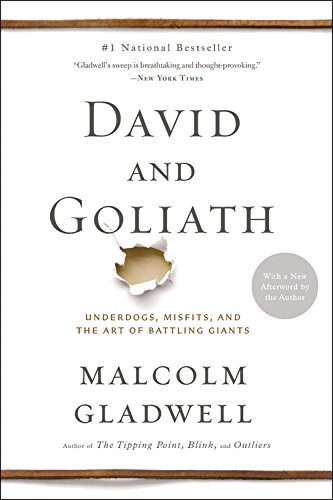All Nonfiction
- Bullying
- Books
- Academic
- Author Interviews
- Celebrity interviews
- College Articles
- College Essays
- Educator of the Year
- Heroes
- Interviews
- Memoir
- Personal Experience
- Sports
- Travel & Culture
All Opinions
- Bullying
- Current Events / Politics
- Discrimination
- Drugs / Alcohol / Smoking
- Entertainment / Celebrities
- Environment
- Love / Relationships
- Movies / Music / TV
- Pop Culture / Trends
- School / College
- Social Issues / Civics
- Spirituality / Religion
- Sports / Hobbies
All Hot Topics
- Bullying
- Community Service
- Environment
- Health
- Letters to the Editor
- Pride & Prejudice
- What Matters
- Back
Summer Guide
- Program Links
- Program Reviews
- Back
College Guide
- College Links
- College Reviews
- College Essays
- College Articles
- Back
David and Goliath by Malcolm Gladwell
David, a little shepherd boy, was not meant to destroy the monstrous Goliath. All the odds tower against him; and precisely for those reasons the tale of David and Goliath has been cemented in history. It remains a common figure of speech today when we describe the underdog pulling through all obstacles. Yet was that fateful battle on the Shephelah as unfair as we assume?
Yet again, Blink author Malcolm Gladwell topples the way we think, this time challenging the way we view advantages and disadvantages. Do we see giants as they really are? Are the underdogs truly who they seem to be? When does benefit turn into detriment?
Perhaps the most amazing quality I found in this book was its ability to relate. Surely anyone remotely aboard the academic “Honors track” has once wondered—where is all this diehard competition going? Are the people at the top really at the greatest advantage? Entering high school, all I seemed to see were people literally killing themselves and occasionally each other to be #1. And although ambition is healthy, I saw mere teenagers growing up warped, grossly weighed down with knowledge while mental and physical disintegrated.
David and Goliath answers in the same vein. Part One of the novel addresses “The Advantages of Disadvantages (and the Disadvantages of Advantages),” while Part Two intros “The Theory of Desirable Difficulty.” (Part Three: “The Limits of Power.”) The title of chapter four struck me, reading You wouldn’t wish dyslexia on your child. Or would you? Again, Gladwell strikes intuitive uprising on what we were once sure we knew—and brings together a group of very real, and very extraordinary group of people to illustrate some of the greatest and most beautiful aspects of the human world arises from supposed divergence.
Similar Articles
JOIN THE DISCUSSION
This article has 0 comments.


What does "THHRe" stand for? Good question! It's THE HOLY HITCHHIKE’S REVIEW...A shorter version of the Hitchhike, reviews of books, movies, music, and just about anything you can dream up. Enjoy, and let loose your commentary and suggestions below. A new column of THH every Friday!
And it's a double week! Don't forget to check out my review on Malcolm Gladwell's bestselling Blink!